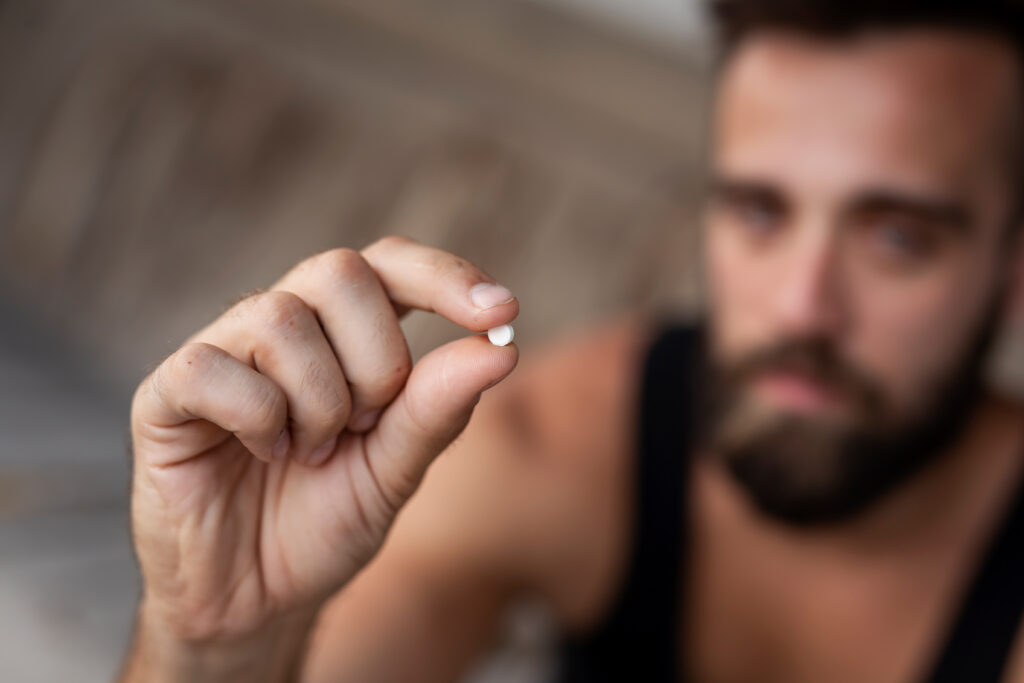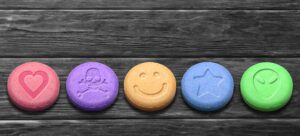MDMA, commonly known as ecstasy or Molly, is a synthetic drug that’s popular at raves and clubs. While it’s known for producing feelings of euphoria and increased energy, questions about whether or not it’s addictive remain unclear.
This article explores what we know about MDMA addiction.
LGBTQ-affirmative substance use treatment is a call away: 888.903.9898.
What Is MDMA?
MDMA (3,4-methylenedioxymethamphetamine) is a synthetic drug that’s classified as a stimulant with potential hallucinogenic effects.
Commonly known as ecstasy (in pill or tablet form) or Molly (as a powder or crystalline substance), MDMA is designated as a Schedule I drug. That means it’s illegal, has no approved medical uses, and carries a high risk of abuse.
Street MDMA often contains other substances like drugs (e.g. ketamine, cocaine, or ephedrine), sugar, or baking powder. Additionally, sometimes what’s sold as MDMA doesn’t have any MDMA in it.
What Are the Effects of MDMA?
Commonly used as a club or party drug, the effects of MDMA include:
- Feelings of euphoria, well-being, and happiness
- Enhanced sense of sight, sound, smell, and touch
- Increased, long-lasting energy
- Empathy for others
- Lowered inhibitions
These sensations typically last between three and five hours, however, they may last up to eight hours. How long the drug lasts depends on the user’s gender and weight, as well as how much they take.
Negative symptoms of MDMA use
In addition to MDMA’s positive effects, the drug presents several negative symptoms. These include:
- Jaw clenching or teeth grinding
- Blurred vision
- Anxiety
- Restlessness
- Insomnia
- Irritability
- Nausea
- Excessive sweating and thirst
- Impulsiveness
- Increased heart rate and blood pressure
- Increased body temperature
In some cases, MDMA can be fatal. Fatal overdoses are more common when MDMA is mixed with other drugs or when people take it in hot, crowded places and overheat.
Is MDMA Addictive?
MDMA’s potential for addiction isn’t as clear-cut as with other illegal drugs. This is largely because pure MDMA is rare on the street. What’s sold is often mixed with other drugs, making it hard to tell if someone is addicted to MDMA or something else.
There’s also not much research on MDMA addiction. Some studies hint that it might be addictive. For example, rats have been found to self-administer MDMA, which points to the drug’s addictiveness. However, these studies also show that animals did not take MDMA as much as some other addictive drugs, such as cocaine.
Another barrier to understanding MDMA’s addictive potential is that MDMA addiction isn’t listed in the Diagnostic and Statistical Manual of Mental Disorders (DSM). Because of this, doctors don’t have a way of officially diagnosing MDMA addiction.
Despite what the research says (or doesn’t say) about MDMA addiction, some users report symptoms of substance use disorder related to the drug. These symptoms tend to be more psychological than physical and include continued use despite negative side effects, tolerance, and craving.
Additionally, MDMA can be part of a larger pattern of multi-drug addiction.
While the scientific picture remains unclear, user experiences suggest that MDMA’s potential for psychological dependence shouldn’t be dismissed.
Symptoms of MDMA Addiction
Although there’s no formal diagnosis for MDMA addiction, people who misuse it might show signs like those of other drug addictions. These can include:
- Taking larger doses than intended
- Developing a tolerance for MDMA and needing to take more to feel the same effects
- Unsuccessfully attempting to cut down
- Spending a lot of time trying to get, use, or recover from taking MDMA
- Having strong cravings for MDMA
- Neglecting daily responsibilities at work, school, or home
- Continuing to use MDMA despite negative consequences
Treatment for MDMA Addiction
Treating MDMA misuse is similar to addressing other substance use issues. It involves managing withdrawal symptoms, dealing with cravings, and preventing relapse. Successful treatment depends on many factors, especially the person’s commitment to recovery and finding the right treatment program.
That’s especially true when it comes to MDMA. Like other club drugs, MDMA disproportionately affects the LGBTQ community. This makes affirmative, culturally sensitive treatment all the more important.
As one of the country’s leading LGBTQ-affirmative treatment centers, La Fuente is uniquely positioned to help you remove MDMA from your life.
To learn more about our Southern California treatment center, call 888.903.9898.




